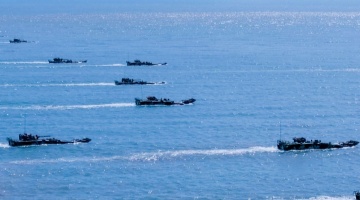By Qin Lizhi
The Japanese government issued relevant decrees on June 25 to expand the continental shelf of the Ogasawara Plateau, which is located on the east side of the Father Island in the Ogasawara Islands, by 120,000 square kilometers. This is a unilateral move that contravenes the United Nations Convention on the Law of the Sea (UNCLOS).
As an island country with scarce land resources, Japan has been developing maritime resources and expanding the scope of such activities for a long time. As early as 2014, Japan, at a meeting of the Headquarters for Ocean Policy, set the policy aimed at extending its continental shelf. A great stock of mineral reserves, including cobalt, nickel and copper, which are needed for the production of new energies, has been proven in the Ogasawara Plateau. Once the decrees are put into practice, Japan would have priority rights to explore the resources beneath the continental shelf according to UNCLOS.
In the long term, the exploitation of these undersea resources will reduce Japan's economic reliance on China, but its strategic effects in the short term are limited due to the great difficulty in exploitation and the low rate of resource conversion. Moreover, Tokyo will need to invest a lot of resources to maintain and develop areas of the newly delimited continental shelf, which may burden it with huge fiscal pressure. Therefore, the move is more driven by considerations for geo-competition than by the urge to claim resources.
What Japan has done goes against the UNCLOS provisions and international practices. The outer limit of a country's continental shelf must be based on the natural extension of land and cannot stretch beyond 350 nautical miles from the baseline or beyond 100 nautical miles from the 2,500 meters isobath. The UNCLOS provides that the request to delimit the continental shelf by its contracting states shall not erode the international seabed or violate the "common heritage of mankind" principle. Japan seeks to expand the outer limit of its continental shelf to beyond the 200 nautical miles, but it didn't provide full and comprehensive documents to prove the existence of the extended continental shelf that could be attributed to it, thus contravening Item 8 of Article 76 of the UNCLOS. Additionally, Japan didn't make revisions to its propositions as per the recommendations of the Commission on the Limits of the Continental Shelf (CLCS). Therefore, its unilateral decision on the expansion is neither final nor binding and will not be recognized by the international community.
While ocean-using countries prefer "freedom of the seas", coastal states are usually inclined towards "reservation of the seas". Japan, along with countries like the US and the Philippines, is pushing the maritime enclosure to expand their continental shelf to the largest extent possible, but they all uphold the so-called "freedom of navigation" in the South China Sea. What a nice show of double standards! They define maritime delimitation and other benefit predilections in terms of maximizing their own maritime rights. Such selfish behaviors will erode the legitimacy of international norms, undermine the existing maritime order, and aggravate territorial disputes on the sea and the upgrading of a naval arms race. Japan, a losing party in WWII, should have shown more constraint in its geopolitical strategy instead of pursuing excessive expansion to achieve its selfish goal of becoming a "normal state".
Japan's unilateral decision to expand the continental shelf is not an isolated case. In recent years, it has taken an active part in the US' "Indo-Pacific strategy", significantly increased its defense budget, muddied the waters in matters concerning China's sea areas, and discharged nuclear contaminated water into the ocean, to name a few. The series of remarks and actions mirror Japan's attempt to break free from the restrictions imposed by the post-WWII system on the political level and adopt the aggressive expansive strategy.
With the intensified strategic competition among major countries, Japan's reinforced strategy of maritime expansion, and the growth of its conservative forces at home, the country is becoming a major hazard threatening the security in the Asia-Pacific region.
(The author is an associate professor at the School of International Affairs and Public Administration and senior researcher at the Institute of Marine Development, Ocean University of China.)
Editor's note: Originally published on china.com.cn, this article is translated from Chinese into English and edited by the China Military Online. The information and opinions in this article do not necessarily reflect the views of eng.chinamil.com.cn.









